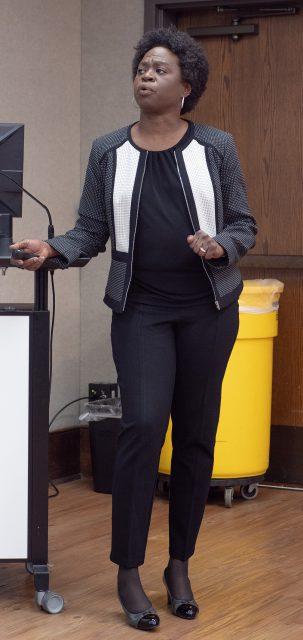By Monica Brigham/reporter
African-Americans do not have more high-risk health behaviors in regards to health disparities. The body keeps score, and having a traumatic past within the Black/African-American community creates a taboo to discuss mental and sexual health issues, speakers told NE students and faculty.
Dr. Terri Major-Kincade and South psychology associate professor Staussa Ervin focused on the discomfort surrounding open conversations tied to health issues in the African-American community during What’s Up Doc.
“The issue is not stigma,” Ervin said. “The issue is historical trauma.”
People who deal with generational trauma have a lower ability to deal with stressors, causing anxiety. Ervin described generational trauma as transference – it is an event that occurred with ancestors, such as slavery that has long term effects on future generations.
“Black/African-American people do seek mental health services, but as a matter of pride, do not share this information readily with other people,” Ervin said.
Ervin distinguishes between the terms black and African-American, because in Texas people tend to lump those from the African diaspora into African-American without realizing they are from the diaspora but are not American.
Ervin linked generational trauma to slavery and the Holocaust. She said what people describe as traumatic is subjective.
“This is a hard topic to talk about when you start talking about taboos and communities,” Major-Kincade said. “When you talk about the history of slavery as a predecessor for a lot of the problems we have in our communities.”
NE student Benjamin West attended the speech to receive ten extra points in history but left with a new outlook.
“I found the speech informative,” West said. “It talks about a lot of mental and physical health aspects in the black community, and the challenges they may face and how they address it.”
Another NE student, Justin Bent, attended in hopes of acquiring information essential to his growth, not only as a black man but as a human.
“You mentioned that there has been a historical issue. How do we move past this?” Bent asked the speaker. “When it comes to stigma, as a black man I am going into a lot of spaces where I start a conversation about sexuality, or how relationship dynamics work, and am turned down. I am met by black men that stigmatize me. It is disheartening.”
Major-Kincade, a neonatal medicine specialist, talked about the black community being set in their ways and focusing on efforts to change the next generation instead of focusing on the past.
“We have an epidemic of sexually-transmitted infections in our black community,” Major-Kincade said. “It is as important as police brutality. It is as important as not having adequate health insurance, and it as important as the number of black men incarcerated.”
Traditionally, conversations in the African-American community about sexual health are taboo. Lack of safe spaces in the community hinder an individual from coming forward and expressing their opinions on mental and sexual health.
“Mistrust of the medical community is huge. It is real,” Major-Kincade said. “You do not have to go back as far as Tuskegee, take a look at the lead in the water in Flint.”
Both speakers poured their knowledge into college students and encouraged the community to create room for taboo topics.
“The lens of choices that we make in respect to our sexual behaviors are lifestyle choices,” Major-Kincade said. “Just like the decisions to smoke or to drink alcohol. These are all lifestyle choices that have a long-term effect.”




























